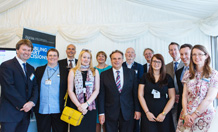-
- Information for new students
- About us
- News
- College news
- News archive
- Events
- Prospective undergraduates
- Prospective postgraduates
- Employability
- Research
- Staff profiles
- Arab and Islamic Studies
- Education
- Law
- Politics
- Sociology, Philosophy and Anthropology
- Exeter Q-Step Centre
- Outreach
- Alumni
- Contact us
- Health and Safety
- Current students
- Staff intranet

Neil Parish MP and LEEP experts
University of Exeter experts to provide crucial advice to farmers, government and communities
Senior politicians have welcomed work by University of Exeter academics to promote smart decision-making which will safeguard the environment.
A new research centre will help government, businesses and communities develop knowledge and understanding about how land and the environment is managed and used. They hope their work will lead to policy being better designed, appraised and evaluated.
This week, the Land, Environment, Economics and Policy Institute was formally launched at the House of Commons at a reception hosted by Neil Parish MP, Chair of the Environment, Food and Rural Affairs Select Committee. Also in attendance were representatives from both national and local organisations including Natural England, the National Farmers Union and the Forestry Commission.
Academics working within LEEP are experts in rural communities and farming families, analysing policy and the economics of the environment. They will work with other research institutes, academics and public and private sector organisations.
LEEP academics have already promoted sustainable agriculture, worked with water companies to improve water quality, worked to save endangered species, such as orangutans, around palm oil plantations in Sumatra, and helped improve monitoring of volcanic activity and trained farmers in agri-environmental management.
Environment Minister Rory Stewart said: “From protecting our wildlife to climate change, environmental policy covers a wide range of issues that are both complex and vital to our country’s environment and economy.
“The work by LEEP will be invaluable in helping us to make sure our decision making is underpinned by the best available scientific research.”
Neil Parish, who is MP for Tiverton and Honiton, said: “It was a great privilege to host the launch of the Land, Environment, Economics and Policy Institute. LEEP aims to look at the big environmental issues that affect our society and suggest holistic solutions to these problems.
“More than ever, we need to be innovative to answer some of the big challenges of the 21st century, such as sustainable food production, urban well-being, pollution and climate change. That’s why it’s so encouraging LEEP has been set up to provide expertise and joined-up thinking to work on these big issues.
“As Chair of the Environment Food and Rural Affairs Select Committee, responsible for holding the Government to account on environmental issues, I look forward to working closely with LEEP in the coming years. I really hope they will provide world-class research to better inform government policy on crucial environmental matters”.
LEEP is governed by four Directors, Professor Ian Bateman, Professor Brett Day, Professor Matt Lobley and Professor Michael Winter, and is advised by an advisory board including leading international academics and representatives of the policy and business communities.
Speaking at the launch, Professor Michael Winter said: “Given recent and continuing political events, it is vital that we don’t lose sight of issues that are not grabbing the headlines. Whatever the UK’s future relationship with the EU, the land endures and we must think hard about its future, its natural capital and its people. LEEP is well placed to deliver the high quality research that will be needed, bringing together the range of necessary approaches from economics, social science, policy analysis and natural science.”
Gretchen Daily, Bing Professor of Environmental Science at Stanford University and a member of the LEEP Advisory Board, said: “It’s such an inspiration to see the LEEP leading the world in developing practical analysis and innovative pathways for achieving green growth.
“This group is number one in integrating science and economics into key decisions affecting people directly, and enhancing the natural environment which underpins prosperity. Working together with policy makers, LEEP demonstrates how to serve society in moving knowledge and innovation into action.”
Date: 30 June 2016
